英语四级背诵
英语四级简单背诵范文(优选7篇)
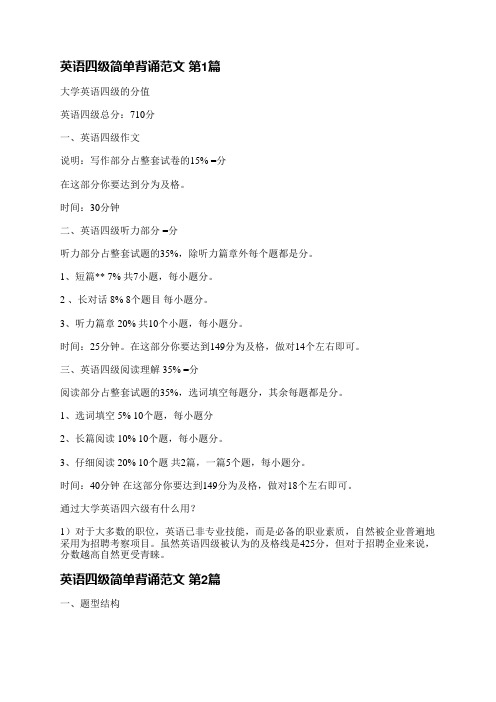
英语四级简单背诵范文第1篇大学英语四级的分值英语四级总分:710分一、英语四级作文说明:写作部分占整套试卷的15% =分在这部分你要达到分为及格。
时间:30分钟二、英语四级听力部分 =分听力部分占整套试题的35%,除听力篇章外每个题都是分。
1、短篇** 7% 共7小题,每小题分。
2 、长对话 8% 8个题目每小题分。
3、听力篇章 20% 共10个小题,每小题分。
时间:25分钟。
在这部分你要达到149分为及格,做对14个左右即可。
三、英语四级阅读理解 35% =分阅读部分占整套试题的35%,选词填空每题分,其余每题都是分。
1、选词填空 5% 10个题,每小题分2、长篇阅读 10% 10个题,每小题分。
3、仔细阅读 20% 10个题共2篇,一篇5个题,每小题分。
时间:40分钟在这部分你要达到149分为及格,做对18个左右即可。
通过大学英语四六级有什么用?1)对于大多数的职位,英语已非专业技能,而是必备的职业素质,自然被企业普遍地采用为招聘考察项目。
虽然英语四级被认为的及格线是425分,但对于招聘企业来说,分数越高自然更受青睐。
英语四级简单背诵范文第2篇一、题型结构大学英语四级的试卷结构、测试内容、测试题型、分值比例和考试时长如下表所示:20xx年英语四级考试题型16年英语四级**各小题分值二、题型描述1)作文写作部分测试学生用英语进行书面表达的能力,所占分值比例为15%,考试时间30分钟。
写作测试选用学生所熟悉的题材,要求学生根据所提供的信息及提示(如:提纲、情景、图片或图表等)写出一篇短文,四级120-180词,六级150-200词。
2)听力为了适应新的形势下社会对大学生英语听力能力需求的变化,进一步提高听力测试的效度,全国大学英语四、六级考试委员会自20xx年6月考试起将对四、六级考试的听力试题作局部调整。
调整的相关内容说明如下:①取消短对话②取消短文听写③新增短篇**(3段),其余测试内容不变。
英语四级4500词汇魔鬼背诵
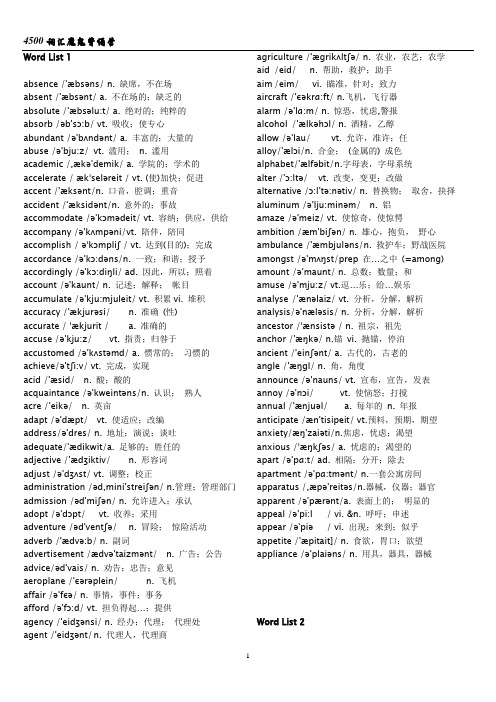
Word List 1absence /'æbsəns/ n. 缺席,不在场absent /'æbsənt/ a. 不在场的;缺乏的absolute /'æbsəlu:t/ a. 绝对的;纯粹的absorb /əb'sɔ:b/ vt. 吸收;使专心abundant /ə'bʌndənt/ a. 丰富的;大量的abuse /ə'bju:z/ v t. 滥用;n. 滥用academic /,ækə'demik/ a. 学院的;学术的accelerate / ækˈseləreit / vt. (使)加快;促进accent /'æksənt/n. 口音,腔调;重音accident /'æksidənt/n. 意外的;事故accommodate /ə'kɔmədeit/ vt. 容纳;供应,供给accompany /ə'kʌmpəni/vt. 陪伴,陪同accomplish / əˈkɔmpliʃ / vt. 达到(目的);完成accordance /ə'kɔ:dəns/n. 一致;和谐;授予accordingly /ə'kɔ:diŋli/ ad. 因此,所以;照着account /ə'kaunt/ n. 记述;解释;帐目accumulate /ə'kju:mjuleit/ vt. 积累vi. 堆积accuracy /'ækjurəsi/ n. 准确(性)accurate / ˈækjurit / a. 准确的accuse /ə'kju:z/ vt. 指责;归咎于accustomed /ə'kʌstəmd/ a. 惯常的;习惯的achieve/ə'tʃi:v/ vt. 完成,实现acid /'æsid/ n. 酸;酸的acquaintance /ə'kweintəns/n. 认识;熟人acre /'eikə/ n. 英亩adapt /ə'dæpt/ vt. 使适应;改编address/ə'dres/ n. 地址;演说;谈吐adequate/'ædikwit/a. 足够的;胜任的adjective /'ædʒiktiv/ n. 形容词adjust /ə'dʒʌst/ vt. 调整;校正administration /əd,mini'streiʃən/ n.管理;管理部门admission /əd'miʃən/ n. 允许进入;承认adopt /ə'dɔpt/ vt. 收养;采用adventure /əd'ventʃə/ n. 冒险;惊险活动adverb /'ædvə:b/ n. 副词advertisement /ædvə'taizmənt/ n. 广告;公告advice/əd'vais/ n. 劝告;忠告;意见aeroplane /'εərəplein/ n. 飞机affair /ə'fεə/ n. 事情,事件;事务afford /ə'fɔ:d/ vt. 担负得起…;提供agency /'eidʒənsi/ n. 经办;代理;代理处agent /'eidʒənt/ n. 代理人,代理商agriculture /'æɡrikʌltʃə/ n. 农业,农艺;农学aid /eid/ n. 帮助,救护;助手aim /eim/ vi. 瞄准,针对;致力aircraft /'εəkrɑ:ft/ n.飞机,飞行器alarm /ə'lɑ:m/ n. 惊恐,忧虑,警报alcohol /'ælkəhɔl/ n. 酒精,乙醇allow /ə'lau/ vt. 允许,准许;任alloy/'ælɔi/n. 合金;(金属的) 成色alphabet/'ælfəbit/n.字母表,字母系统alter /'ɔ:ltə/ vt. 改变,变更;改做alternative /ɔ:l'tə:nətiv/ n. 替换物;取舍,抉择aluminum /ə'lju:minəm/ n. 铝amaze /ə'meiz/ vt. 使惊奇,使惊愕ambition /æm'biʃən/ n. 雄心,抱负,野心ambulance /'æmbjuləns/n. 救护车;野战医院amongst /ə'mʌŋst/prep 在…之中(=among) amount /ə'maunt/ n. 总数;数量;和amuse /ə'mju:z/ vt.逗…乐;给…娱乐analyse /'ænəlaiz/ vt. 分析,分解,解析analysis/ə'næləsis/ n. 分析,分解,解析ancestor /ˈænsistə / n. 祖宗,祖先anchor /'æŋkə/ n.锚vi. 抛锚,停泊ancient /'einʃənt/ a. 古代的,古老的angle /'æŋɡl/ n. 角,角度announce /ə'nauns/ vt. 宣布,宣告,发表annoy /ə'nɔi/ vt. 使恼怒;打搅annual /'ænjuəl/ a. 每年的n. 年报anticipate /æn'tisipeit/ vt.预料,预期,期望anxiety/æŋ'zaiəti/n.焦虑,忧虑;渴望anxious /ˈæŋkʃəs/ a. 忧虑的;渴望的apart /ə'pɑ:t/ ad. 相隔;分开;除去apartment /ə'pɑ:tmənt/ n.一套公寓房间apparatus /,æpə'reitəs/n.器械,仪器;器官apparent /ə'pærənt/a. 表面上的;明显的appeal /ə'pi:l / vi. &n. 呼吁;申述appear /ə'piə/ vi. 出现;来到;似乎appetite /'æpitait]/ n. 食欲,胃口;欲望appliance /ə'plaiəns/ n. 用具,器具,器械Word List 2Applicable [æplikəbəl] a. 能应用的;适当的Application [æpliˈkeiʃ(ə)n] n. 请求,申请;施用appoint [əˈpɔint] vt. 任命,委任;约定appreciate [əˈpri:ʃieit] vt. 欣赏;领会Approach [əˈprəutʃ] vt. 向…靠近n. 靠近appropriate[əˈprəuprieit]a. 适当的,恰当的approval [əˈpru:vəl] n. 赞成,同意;批准approve [əˈpru:v] vt. 赞成,称许;批准approximate[əˈprɔksimit] a. 近似的vt. 近似arbitrary[ˈɑ:bitrəri] a. 随心所欲的;专断的architecture[ˈɑ:kitektʃə] n. 建筑学;建筑式样argue[ˈɑ:gju:]vi. 争论,争辩argument[ˈɑ:gju:mənt] n. 争论,辩论;理由arise[əˈraiz] vi. 出现;由…引起arouse[əˈrauz] vt. 引起;唤醒arrange[əˈreindʒ] vt. 筹备;整理;调解arrangement [əˈreindʒmənt] n. 整理,排列;安排arrest[əˈrest] vt. 逮捕,拘留arrow[ˈærəu] n. 箭;箭状物art [ɑ:t] n. 艺术,美术;技术article [ˈɑ:tik(ə)l] n. 文章;条款;物品artificial[ˌɑ:tiˈfiʃəl]a. 人工的;造作的artist [ˈɑ:tist]n. 艺术家,美术家artistic[ɑ:ˈtistik] a. 艺术的;艺术家的ashamed[əˈʃeimd] a. 惭愧(的) assemble[əˈsembəl] vt. 集合,召集;装配assembly əˈsembli] n. 集合;集会;装配assess[əˈses] vt. 对(财产等)估价associate[əˈsəuʃieit] vi. 交往n. 伙伴,同事association [əˌsəusiˈeiʃən] n. 协会,团体;联合assume[əˈsju:m] vt. 假定;承担;astonish [əˈstɔniʃ] vt. 使惊讶,使吃惊Atlantic[ətˈlæntik] a. 大西洋的n. 大西洋atmosphere [ˈætməsfiə] n. 大气;空气;气氛atom [ˈætəm] n. 原子;微粒;微量attempt [əˈtempt] vt. 尝试,试图n. 企图audience [ˈɔ:diəns] n. 听众,观众,读者authority [ɔ:ˈθɔriti] n. 当局,官方;权力auxiliary[ɔ:gˈziljəri] a. 辅助的;附属的avenue [ˈævənju:, ˈævinju:]n. 林荫道;大街average [ˈævəridʒ] a. 平均数;平均的awful [ˈɔ:ful] a. 令人不愉快的ax [æks] n. 斧子bacteria [bækˈtiəriən. 细菌baggage[ˈbægidʒ] n. 行李bake [beik] v. 烤,烘,焙;烧硬balloon [bəˈlu:n] n. 气球,玩具气球band [bænd] n. 乐队;带;波段bang [bæŋ]n. 巨响,枪声;猛击barber [ˈbɑ:bə]n. 理发师bare [beə] a. 赤裸的;仅仅的bargain[ˈbɑ:gin] n. 交易barrel [ˈbærəl] n. 桶;圆筒;枪管bay [bei] n. 湾;山脉中的凹处beach [bi:tʃ]n. 海滩,湖滩,河滩beam [bi:m] n. 梁;横梁;束,柱bean [bi:n] n. 豆,蚕豆beard [biəd] n. 胡须,络腮胡子beast [bi:st] n. 兽,野兽;牲畜beef [bi:f] n. 牛肉;菜牛belief [biˈli:f] n. 信任,相信;信念belt [belt] n. 带,腰带;皮带;bench [bentʃ] n. 长凳,条凳bend [bend] v. 使弯曲;弯曲beneficial [ˌbeniˈfiʃəl] a. 有利的,有益的benefit[ˈbenifit]n.利益;恩惠;津贴Bible [ˈbaibl]n. 基督教《圣经》billion[ˈbiljən] n/ num. 十亿(美) biscuit [ˈbiskit]n. (英) 饼干bit [bit] n. 一点,一些,小片bite [bait] vt. 咬,叮;剌穿bitter [ˈbitə] a. 痛苦的;严寒的blade [bleid] n. 刀刃,刀片;叶片blame [bleim] vt. 责备,归咎于blank [blæŋk] a. 空白的n. 空白blanket[ˈblæŋkit]n. 毛毯,毯子blast [blɑ:st]n. 爆炸vt. 炸blend [blend] vt. &vi. &n. 混和block [blɔk] n. 街区vt. 堵塞bloom [blu:m] n. 花;开花,开花期Word List 3blow [bləu] vi. 吹,吹动;吹响boast [bəust] vi. 自夸vt. 吹嘘bold [bəuld] a. 大胆的;冒失的bolt [bəult] n. 插销vt. 闩门bomb [bɔm] n. 炸弹vt. 轰炸bond [bɔnd] n. 联结,联系;公债boot [bu:t] n. 靴子,长统靴bother ['bɔðə] vt. 迷惑n. 麻烦bottle ['bɔtl] n. 瓶,酒瓶;一瓶bounce [bauns] vi. 反跳,弹起bound [baund] a. 一定的;有义务的boundary ['baundri] n. 分界线,办界bow [bəu] n. 弓;蝴蝶结;鞠躬bowl [bəul] n. 碗,钵;碗状物brake [breik] n. 闸,刹车branch [bræntʃ] n. 树枝;分部;分科brand [brænd] n. 商品;vt. 铭刻brass [bræs] n. 黄铜;黄铜器breast [brest] n. 乳房;胸脯,胸膛breed [bri:d] n. 品种vt. 使繁殖breeze [bri:z] n. 微风,和风brick [brik] n. 砖,砖块;砖状物bride [braid] n. 新娘brilliant ['briljənt] a. 光辉的;卓越的brow [brau] n. 额;眉,眉毛brown [braun] n. 褐色,棕色brush [brʌʃ] n. 刷子,毛刷;画笔bubble ['bʌbl] n. 泡vi. 冒泡bucket ['bʌkit] n. 水桶;吊桶;铲斗bulb [bʌlb] n. 电灯泡;球状物bulk [bʌlk] n. 物体,容积,大批bundle ['bʌndl] n. 捆,包,束;包袱bureau ['bjuərəu] n. 局,司,处burst [bə:st] vi. &n. 爆炸bush [buʃ] n. 灌木,灌木丛butter ['bʌtə] n. 黄油;奶油button ['bʌtn] n. 扣子;按钮cabbage ['kæbidʒ] n. 洋白菜,卷心菜cabin ['kæbin] n. 小屋;船舱,机舱cabinet ['kæbinit] n. 橱,柜;内阁cable ['keibl] n. 电缆;电报calculate ['kælkju,leit] vt. 计算;估计;计划calculator ['kælkju,leitə] n. 计算器,计算者calendar ['kælində] n. 日历,历书;历法camp [kæmp] n. 野营,营地,兵营campaign [kæm'pein] n. 战役;运动campus ['kæmpəs] n. 校园,学校场地canal [kə'næl] n. 运河;沟渠;管candidate ['kændidit] n. 候选人;投考者candle ['kændl] n. 蜡烛;烛光capacity [kə'pæsiti] n. 容量;能力;能量capital ['kæpitl] n. 资本,资金;首都captain ['kæptin] n. 陆军上尉;队长capture ['kæptʃə] vt. 捕获,俘获;夺得carbon ['kɑ:bən]n. 碳career [kə'riə] n. 生涯,职业,经历cargo ['kɑ:gəu]n. 船货,货物carpenter ['kɑ:pintə] n. 木工,木匠carpet ['kɑ:pit]n. 地毯,毡毯,毛毯carriage ['kæridʒ] n. 客车厢;四轮马车carrier ['kæriə] n. 运输工具cart [kɑ:t]n. 二轮运货马车case [keis] n. 箱(子) ,盒cassette [kə'set] n. 盒式录音带;盒子cast [kɑ:st]vt. 投,扔,抛castle ['kɑ:sl]n. 城堡;巨大建筑物casual ['kæʒjuəl] a. 偶然的;随便的cattle ['kætl] n. 牛;牲口,家畜cease [si:s] vi. &vi. &n. 停止ceiling ['si:liŋ]n. 天花板,顶蓬celebrate ['selibreit] vt. 庆祝;歌颂,赞美cell [sel] n. 细胞;小房间cement [si'ment] n. 水泥;vt. 粘结centimetre ['senti,mi:tə] n. 公分,厘米ceremony ['seriməni] n. 典礼,仪式;礼节certificate [sə'tifikit] n. 证书,证件,执照chain [tʃein] n. 链,链条,项圈challenge ['tʃælindʒ] n. 挑战;要求,需要chamber ['tʃeimbə] n. 会议室;房间;腔champion ['tʃæmpjən] n. 冠军,得胜者Word List 4channel ['tʃænl] n. 海峡;渠道;频道chapter ['tʃæptə] n. 章,回,篇character ['kærəktə] n. 性格;特性;角色characteristic [kærəktə'rɪstɪk] a. 特有的n. 特性charge [tʃɑːdʒ]vt.控告n. 费用chart [tʃɑːt]n. 图,图表;海图chase [tʃeis]n. 追逐,追赶,追求cheek [tʃiːk] n. 面颊,脸蛋cheer [tʃɪə] vt. 使振作;欢呼cheerful ['tʃɪəfʊl]a. 快乐的,愉快的cheese [tʃi:z] n. 乳酪,干酪cheque [tʃek] n. 支票chess [tʃes] n. 棋;国际象棋chest [tʃest] n. 胸腔,胸膛;箱子chew [tʃest] vt. 咀嚼,嚼碎chief [tʃest] a. 主要的;首席的chill [tʃil] vt. 使变冷n. 寒冷chimney ['tʃimni] n. 烟囱,烟筒;玻璃罩chin [tʃin] n. 颏,下巴choke [tʃəuk]vt. 使窒息;塞满choose [tʃu:z]vt. 选择,挑选chop [tʃɔp]vt. 砍,劈;切细Christian ['kristʃən] n. 基督教徒;信徒Christmas ['krisməs] n. 圣诞节clap [klæp] vi. 拍手vt. 轻拍claw [klɔ:] n. 爪,脚爪,螯clay [klei] n. 粘土,泥土;肉体clerk [klə:k] n. 店员,职员cliff [klif] n. 悬崖,峭壁clue [klu:] n. 线索,暗示,提示clumsy ['klʌmzi]a. 笨拙的;愚笨的coach [kəʊtʃ]n. 长途公共汽车coarse [kɔːs]a. 粗的,粗糙的coast [kəʊst] n. 海岸,海滨code [kəud] n. 准则;法典;代码coil [kɔil] n. (一) 卷;线圈collapse [kə'læps]vi. 倒坍;崩溃,瓦解collar ['kɔlə]n. 衣领,项圈colleague ['kɒliːg] n. 同事,同僚collision [kə'liʒən]n. 碰撞;冲突colony ['kɔləni]n. 殖民地;侨居地column ['kɔləm]n. 柱,支柱,圆柱comb [kəʊm] n. 梳子vt. 梳理combination [kɒmbɪ'neɪʃn] n. 结合,联合;化合combine [kəm'bain] vt. 使结合;兼有command [kə'mɑ:nd] vt. 命令,指挥commander [kə'mɑ:ndə]n. 司令官,指挥员comment ['kɔment]n. 评论,意见;注释commerce ['kɔmə:s] n. 商业,贸易;社交commercial [kə'mə:ʃəl] a. 商业的;商品化的commission [kə'miʃən] n. 委任状;委员会commit [kə'mit] v t. 犯(错误)committee [kə'miti]n. 委员会;全体委员communicate [kə'mju:nikeit] vi. 通;传播communication [kəˌmju:ni'keiʃn] n. 通讯;传达;交通communism ['kɔmjunizəm] n. 共产主义communist ['kɔmjunist] n. 共产党员community [kə'mju:niti] n. 社区;社会;公社companion [kəm'pænjən] n. 同伴;共事者company ['kʌmpəni] n. 公司,商号;同伴comparative [kəm'pærətiv] a. 比较的,相对的compare [kəm'pɛə] vt. 比较,对照comparison [kəm'pærisn;kəm] n. 比较,对照;比似compass ['kʌmpəs]n. 罗盘,指南针compel [kəm'pel] vt. 强迫,迫使屈服compete [kəm'pi:t] vi. 比赛;竞争competent ['kɔmpitənt] a. 有能力的competition [kɔmpi'tiʃən] n. 竞争,比赛complain [kəm'plein]vi. 抱怨,诉苦complaint [kəm'pleint] n. 抱怨;怨言;控告complex ['kɔmpleks] a. 结合的;复杂的complicated ['kɔmplikeitid] a. 复杂的,难懂的component [kəm'pəunənt] n. 组成部分compose [kəm'pəuz]vt. 组成;创作composition [ˌkɔmpə'ziʃən] n. 构成;作品;写作compound ['kɔmpaund] n. 化合物;复合词comprehension [ˌkɔmpri'henʃən] n. 理解comprehensive [ˌkɔmpri'hensiv] a. 广泛的;理解的compress [kəm'pres] vt. 压紧,压缩comprise [kəm'praiz] vt. 包含;构成Word List 5compromise /ˈkɒmprəmaɪz/ n. 妥协,和解conceal /kənˈsi:l / vt. 把…隐藏起来concentrate /ˈkɒnsntreɪt/ vt. 集中;聚集concentration /ˌkɒnsnˈtreɪʃn/ n. 集中;专注concept /ˈkɒnsept/ n. 概念,观念,设想concern /kənˈsɜːn/ n. 关心,挂念;关系concerning /kənˈsɜːnɪŋ/prep. 关于concert /ˈkɒnsət/ n. 音乐会,演奏会concrete /ˈkɒŋkriːt/ n. 混凝土;具体物condemn /kənˈdem/vt. 谴责,指责condense /kənˈdens/vt. 压缩,使缩短confess /kənˈfes/ vt. 承认;坦白confidence /ˈkɒnfɪdəns/ n. 信任;信赖;信心confident /ˈkɒnfɪdənt/ n. 确信的,自信的confine /kənˈfaɪn/ vt. 限制;禁闭confirm /kənˈfɜːm/ vt.肯定;批准conflict /ˈkɒnflɪkt/ n. 争论;冲突;斗争confuse /kənˈfjuːz/ vt. 使混乱,混淆conjunction /kənˈdʒʌŋkʃn/ n. 连接;连接词conquer /ˈkɒŋkə(r)/ vt. 征服,战胜conquest /ˈkɒŋkwest/ n. 攻取,征服;克服conscience /ˈkɒnʃəns/ n. 良心,道德心conscious /ˈkɒnʃəs/ a. 意识到的;有意的consciousness /ˈkɒnʃəsnəs/ n. 意识,觉悟consent /kənˈsent/ n. 同意,赞成consequence /ˈkɒnsɪkwəns/ n. 结果,后果consequently /ˈkɒnsɪkwəntli/ ad. 因此,因而consult /kənˈsʌlt/ vt. 请教,查阅contact /ˈkɒntækt/ vt. 使接触,联系contemporary /kənˈtemprəri/ a. 当代的,同时代的contempt /kənˈtempt/ n. 轻蔑;藐视;受辱content /ˈkɒntent/ n. 内容,目录;容量content /kənˈtent/ a. 满意的,满足的contest /kənˈtest/ vt. 争夺,争取continent /ˈkɒntɪnənt/ n. 大陆;陆地;洲continual /kənˈtɪnjuəl/ a. 不断的;连续的continuous /kənˈtɪnjuəs/ a. 连续不断的contract /ˈkɒntrækt/ n. 契约,合同;婚约contradiction /ˌkɒntrəˈdɪkʃn/ n. 矛盾,不一致contrary /ˈkɒntrəri/ a. 相反的n. 相反contrast /ˈkɒntrɑːst/ n. 对比,对照,悬殊convenience /kənˈviːniəns/ n. 便利,方便;厕所convenient /kənˈviːniənt/ a. 便利的;近便的convention /kənˈvenʃn/ n. 习俗,惯例;公约conventional /kənˈvenʃənl/ a. 普通的;习惯的conversely /ˈkɒnvɜːsli/ad. 相反地conversion /kənˈvɜːʃn/ n. 转变,转化;改变convert /kənˈvɜːt/ vt. 使转变;使改变convey /kənˈveɪ/ vt. 传送;传播convince /kənˈvɪns/ vt. 使确信,使信服coordinate /kəʊˈɔːdɪneɪt/ vt. 使协调,调节cope /kəʊp/ vi. 对付,应付copper /ˈkɒpə(r)/ n. 铜;铜币,铜制器core /kɔː(r)/n. 果实的心,核心corporation /ˌkɔːpəˈreɪʃn/ n. 公司,企业;社团correspond /ˌkɒrəˈspɒnd/ vi. 相符合;相当corresponding /ˌkɒrəˈspɒndɪŋ/ a. 相应的;符合的corridor /ˈkɒrɪdɔː(r)/ n. 走廊,回廊,通路costly /ˈkɒstli/ a. 昂贵的;价值高的council /ˈkaʊnsl/ n. 理事会,委员会cousin /ˈkʌzn/ n. 堂(或表) 兄弟(姐妹)crack /kræk/ n. 裂缝vi. 爆裂craft /krɑːft/n. 工艺;手艺,行业crane /kreɪn/ n. 起重机,升降机crash /kræʃ/ vi. 坠落n. 碰撞crawl /krɔ:l/ vi. 爬,爬行create /kriˈeɪt/ vt. 创造;引起creative /kriˈeɪtɪv/ a. 创造性的,创作的creature /ˈkriːtʃə(r)/ n. 生物,动物,家畜credit /ˈkredɪt/ n. 信用贷款;信用creep /kriːp/vi. 爬行crew /kruː/n. 全体船员crime /kraɪm/ n. 罪,罪行;犯罪criminal /ˈkrɪmɪnl/ n. 犯人,罪犯crisis /ˈkraɪsɪs/ n. 危机;存亡之际critic /ˈkrɪtɪk/ n. 批评家critical /ˈkrɪtɪkl/ a. 决定性的;批评的criticism /ˈkrɪtɪsɪzəm/ n. 批评;批判;评论criticize /ˈkrɪtɪsaɪz/ vt. 批评;评论crowd /kraʊd/ n. 群;大众;一伙Word List 6crown [kraun] n. 王冠,冕;花冠crude [kru:d] a. 简陋的;天然的crush [krʌʃ] vt. 压碎;镇压crust [krʌst] n. 面包皮;硬外皮crystal [ˈkristəl] n. 水晶,结晶体cube [kju:b] n. 立方形;立方cubic [ˈkju:bik] a. 立方形的;立方的cultivate[ˈkʌltiveit]vt. 耕;种植;培养curiosity[ˌkjuəriˈɔsiti] n. 好奇,好奇心curious [ˈkjuəriəs]a. 好奇的;古怪的curse [kə:s] n. 诅咒,咒骂;天谴curtain [ˈkə:tən] n. 帘,窗帘;幕(布) curve [kə:v] n. 曲线;vt. 弄弯cushion [ˈkuʃən] n. 垫子,坐垫,靠垫daily [ˈdeili]a. 每日的n. 日报dairy [ˈdeəri] n. 牛奶场;乳制品dam [dæm] n. 水坝,水堤damp [dæmp] a. 潮湿的,有湿气的darling [ˈdɑ:liŋ] n. 亲爱的人;宠儿dash [dæʃ] vt. 使猛撞n. 猛冲dawn [dɔ:n] n. 黎明vi. 破晓deaf [def] a. 聋的;不愿听的deal [di:l] n. 买卖;vt. 给予debate [diˈbeit]n. &vi. 争论,辩论debt [det] n. 债,债务,欠债decade [ˈdekeid]n. 十年,十年期decay [diˈkei]vi. 腐烂;n. 腐烂deceive [diˈsi:v] vt. 欺骗,蒙蔽deck [dek] n. 甲板;舱面;层面declare [diˈklɛə] vt. 断言;声明decorate [ˈdekəreit] vt. 装饰,装潢decrease [diˈkri:s, ˈdi:kri:s] vi. &n. 减少,减少defect [diˈfekt, ˈdi:fekt]n. 缺点,缺陷,欠缺defense [diˈfens] n. 防御;防务;辩护defend [diˈfend]vt. 保卫,防守define [diˈfain]vt. 给…下定义definite [ˈdefinit]a. 明确的;肯定的definitely [ˈdefinitli]ad. 一定地,明确地definition[ˌdefiˈniʃən]n. 定义,释义;定界delay [diˈlei]vt. 推迟;延误delete [diˈli:t]vt. 删除;擦掉delicate[ˈdelikeit] a. 纤细的;易碎的delicious[diˈliʃəs] a. 美味的,怡人的deliver [diˈlivə] vt. 投递,送交demand [diˈmɑ:nd] vt. 要求;需要democracy[diˈmɔkrəsi] n. 民主,民主制democratic [ˌdeməˈkrætik] a. 民主的demonstrate[ˈdemənstreit] vt. 说明;论证dense [dens] a. 密集的;浓厚的density[ˈdensiti] n. 密集,稠密;密度deny [diˈnai]vt. 否定;拒绝相信depart [diˈpɑ:t]vi. 离开;出发department[diˈpɑ:tmənt]n. 部,司,局,处departure[diˈpɑ:tʃə]n. 离开,出发,起程deposit [diˈpɔzit] vt. 使沉淀;存放derive [diˈraiv]vt. 取得vi. 起源descend [diˈsend] vi. 下来,下降describe[diˈskraib] vt. 描写,描绘description[diˈskripʃən]n. 描写,形容;种类desert [diˈzə:t] n. 沙漠vt. 离弃deserve [diˈzə:v] vt. 应受,值得despair [diˈspeə] n. 绝望vi. 绝望desperate[ˈdespərit]a. 拼死的;绝望的despite [diˈspait] prep. 不管,不顾destination[ˌdestiˈneiʃən] n. 目的地;目标detail [ˈdi:teil] n. 细节;枝节;零件detect [diˈtekt] vt. 察觉,发觉detection [diˈtekʃən] n. 察觉,发觉;侦察device[diˈvais]n. 器械,装置;设计devil [ˈdevəl] n. 魔鬼,恶魔devise [diˈvaiz]vt. 设计,发明diamond [ˈdaiəmənd] n. 金钢石,钻石diary [ˈdaiəri] n. 日记,日记簿dig [dig] vt.& vi.掘,挖;采掘digest [diˈdʒest ˈdaidʒest]vt. 消化;n.文摘digital [ˈdidʒitl] a. 数字的,计数的dim [dim] a. 昏暗的;朦胧的dimension [diˈmenʃən] n. 尺寸,尺度;面积dip [dip] vt. 浸,蘸disadvantage [ˌdisədˈvɑ:ntidʒ]n. 不利,不利地位。
四级必背词汇
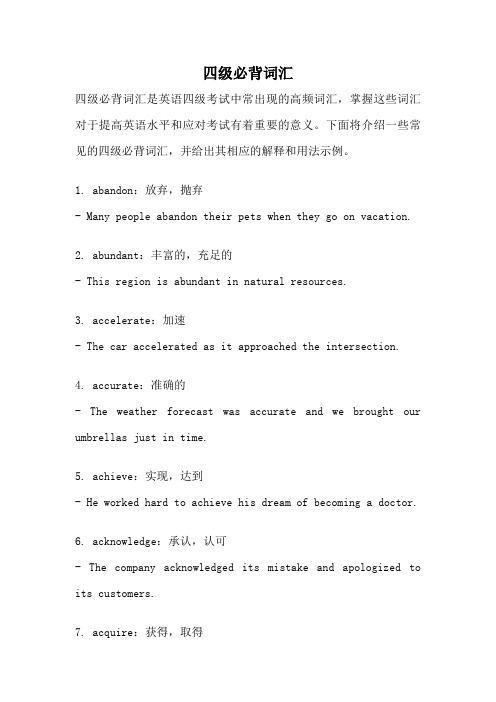
四级必背词汇四级必背词汇是英语四级考试中常出现的高频词汇,掌握这些词汇对于提高英语水平和应对考试有着重要的意义。
下面将介绍一些常见的四级必背词汇,并给出其相应的解释和用法示例。
1. abandon:放弃,抛弃- Many people abandon their pets when they go on vacation. 2. abundant:丰富的,充足的- This region is abundant in natural resources.3. accelerate:加速- The car accelerated as it approached the intersection.4. accurate:准确的- The weather forecast was accurate and we brought our umbrellas just in time.5. achieve:实现,达到- He worked hard to achieve his dream of becoming a doctor.6. acknowledge:承认,认可- The company acknowledged its mistake and apologized to its customers.7. acquire:获得,取得- She acquired a new skill after attending a training workshop.8. adapt:适应,使适应- It took her some time to adapt to the new environment.9. adequate:足够的,充足的- The company provided its employees with adequate training for the new software.10. adjust:调整,适应- Please adjust the volume of the TV to a comfortable level.11. administer:管理,执行- The nurse will administer the medication to the patient. 12. advocate:提倡,拥护- Many people advocate for stricter gun control laws.13. aid:帮助,援助- The Red Cross provides aid to those affected by natural disasters.14. alert:警惕的,警觉的- Be alert and watch out for any suspicious activity.15. allocate:分配,拨出- The government plans to allocate more funds for education.16. alter:改变,修改- He decided to alter his travel plans and go to a different destination.17. analyze:分析,分解- The scientist analyzed the data and drew some interesting conclusions.18. annual:每年的,年度的- The company holds its annual meeting in December.19. anticipate:预期,预料- We anticipate that the project will be completed by the end of the month.20. anxious:焦虑的,担心的- She was anxious about the upcoming job interview.以上是一些常见的四级必背词汇及其用法示例。
英语四级必背词汇

英语四级必背词汇一、A开头。
1. abandon [əˈbændən] vt. 放弃;遗弃;抛弃 n. 放任;狂热。
2. ability [əˈbɪləti] n. 能力;才能。
3. abnormal [æbˈnɔːml] adj. 反常的;不正常的;变态的。
二、B开头。
1. back [bæk] n. 后面;背部;靠背;足球等的后卫 vt. 支持;后退;背书;下赌注 vi. 后退;背靠;倒退 adv. 以前;向后地;来回地;上溯 adj. 后面的;过去的;拖欠的。
2. balance [ˈbæləns] n. 平衡;余额;匀称 vt. 使平衡;结算;使相称 vi. 保持平衡;相称;抵销。
3. bare [beə(r)] adj. 空的;赤裸的,无遮蔽的 vt. 露出,使赤裸。
三、C开头。
1. calculate [ˈkælkjuleɪt] vt. 计算;预测;认为;打算 vi. 计算;以为;作打算。
2. call [kɔːl] vt. 呼叫;称呼;召集;认为;打电话给 n. 电话;呼叫;要求;访问 vi. 呼叫;拜访;叫牌。
3. campus [ˈkæmpəs] n. (大学)校园;大学,大学生活;校园内的草地。
四、D开头。
1. damage [ˈdæmɪdʒ] n. 损害;损毁;赔偿金 vt. 损害,毁坏。
2. dare [deə(r)] vt. 敢冒;不惧;敢面对 n. 挑战;挑动 aux. 敢,竟敢(用于疑问、否定句等)3. deal [diːl] vt. 处理;给予;分配;发牌 vi. 处理;做生意;对待;讨论n. 交易;(美)政策;待遇;份量。
五、E开头。
1. earn [ɜːn] vt. 赚,赚得;获得,挣得;使得到;博得。
2. earth [ɜːθ] n. 地球;地表,陆地;土地,土壤;尘事,俗事;兽穴 vt. 把(电线)接地;盖(土);追赶入洞穴 vi. 躲进地洞。
英语四级简单背诵范文(共13篇)_1
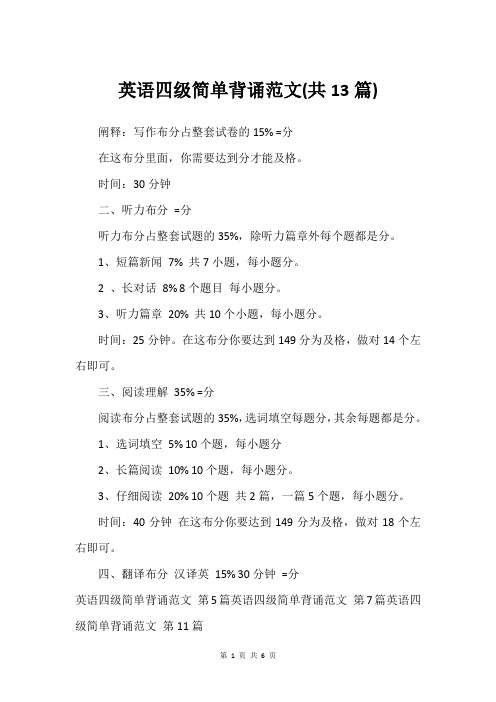
英语四级简单背诵范文(共13篇)阐释:写作布分占整套试卷的15% =分在这布分里面,你需要达到分才能及格。
时间:30分钟二、听力布分=分听力布分占整套试题的35%,除听力篇章外每个题都是分。
1、短篇新闻7% 共7小题,每小题分。
2 、长对话8% 8个题目每小题分。
3、听力篇章20% 共10个小题,每小题分。
时间:25分钟。
在这布分你要达到149分为及格,做对14个左右即可。
三、阅读理解35% =分阅读布分占整套试题的35%,选词填空每题分,其余每题都是分。
1、选词填空5% 10个题,每小题分2、长篇阅读10% 10个题,每小题分。
3、仔细阅读20% 10个题共2篇,一篇5个题,每小题分。
时间:40分钟在这布分你要达到149分为及格,做对18个左右即可。
四、翻译布分汉译英15% 30分钟=分英语四级简单背诵范文第5篇英语四级简单背诵范文第7篇英语四级简单背诵范文第11篇1. 每天全世界都有成千上万的人死于交通事故;2. 分析产生交通事故的原因;3. 应该制定交通法规遏止交通事故的发生。
Only Stricter Traffic Laws Can Prevent AccidentsThough the possibility of living a long and happy life is greater than ever before, every day thousands of people all over the world are killed or horribly mutilated on the roads just because of traffic accidents.This situation is mainly due to the following two reasons. In the first place, the drivers are becoming less aware of social morality. When they are sitting behind a steering wheel, they totally forget the traffic laws which should be complied with. In the second place, the surprising thing is that society smiles so benignly on the peace breakers and seems to condone their behavior. As the transportation develops, cities become almost uninhabitable because of heavy traffic and the countryside is destroyed by the complicated road networks.Therefore,_created_tojreduce this_jen^jlessjwa^e_of“human _life and to_have some beneficial_ effect on the accident rate. (153 words)英语四级简单背诵范文第12篇1、学单词单词不必照单词本背,效果不好,背单词的目的是会用,不会用等于白背。
英语四级范文背诵带翻译(汇总13篇)
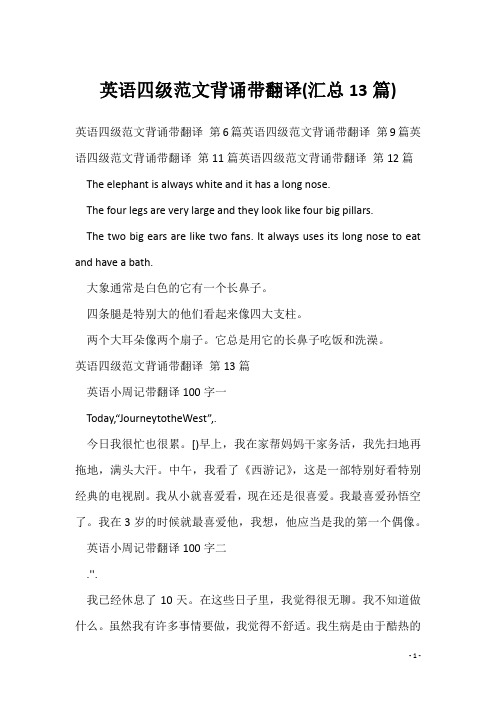
英语四级范文背诵带翻译(汇总13篇)英语四级范文背诵带翻译第6篇英语四级范文背诵带翻译第9篇英语四级范文背诵带翻译第11篇英语四级范文背诵带翻译第12篇The elephant is always white and it has a long nose.The four legs are very large and they look like four big pillars.The two big ears are like two fans. It always uses its long nose to eat and have a bath.大象通常是白色的它有一个长鼻子。
四条腿是特别大的他们看起来像四大支柱。
两个大耳朵像两个扇子。
它总是用它的长鼻子吃饭和洗澡。
英语四级范文背诵带翻译第13篇英语小周记带翻译100字一Today,“JourneytotheWest”,.今日我很忙也很累。
[)早上,我在家帮妈妈干家务活,我先扫地再拖地,满头大汗。
中午,我看了《西游记》,这是一部特别好看特别经典的电视剧。
我从小就喜爱看,现在还是很喜爱。
我最喜爱孙悟空了。
我在3岁的时候就最喜爱他,我想,他应当是我的第一个偶像。
英语小周记带翻译100字二.''.我已经休息了10天。
在这些日子里,我觉得很无聊。
我不知道做什么。
虽然我有许多事情要做,我觉得不舒适。
我生病是由于酷热的天气。
我累了,困,也没有力气。
我的父母担忧我的健康。
事实上,这并不重要。
我总是在房间空调打开了它在低温。
因此,当我走了出去,高温不给我。
在最终,我被虐待。
英语小周记带翻译100字三D,.Aftercooking,.这是特别酷热和潮湿的今日,被称为桑拿天气。
在我妈妈没有做饭的`厨房,我看到她的头部很美丽。
我告知她,我可以关心她,她接受。
经过烹饪,我们都汗流浃背。
然而,()妈妈和我都感到兴奋。
她说,我的成长过程,并成为她的好助手。
考英语四级必备知识点总结
考英语四级必备知识点总结一、语法1. 名词:名词的数、格、所有格、复合名词等形式;2. 代词:人称代词、物主代词、指示代词、不定代词、相互代词等;3. 冠词:冠词的用法和区别;4. 形容词:形容词的比较级、最高级、修饰顺序等;5. 副词:副词的位置、修饰范围、比较级等;6. 介词:介词的用法、固定搭配、介词短语等;7. 连词:并列连词、从属连词、关联词等;8. 动词:动词的时态、语态、情态动词、动词的非谓语形式、虚拟语气等;9. 主谓一致:主语和谓语动词的一致性;10. 从句:定语从句、表语从句、宾语从句、状语从句等;二、词汇1. 同义词和反义词:掌握同义词和反义词的意义、用法和搭配;2. 词组搭配:掌握固定搭配、习惯搭配等;3. 词根词缀:掌握常见的词根和词缀,用于理解词义和构词法;4. 词性转换:学会名词、动词、形容词、副词之间的转换;三、时态1. 一般现在时:表示经常性、习惯性的动作和真理;2. 现在进行时:表示现阶段正在进行的动作;3. 一般过去时:表示过去的某个时间内发生的动作或状态;4. 过去进行时:表示过去某一时刻或一段时间内正在进行的动作;5. 现在完成时:表示动作发生在过去的某个时间,对现在的影响;6. 过去完成时:表示过去某个时间或某个动作之前已经完成的动作;7. 一般将来时:表示将来某个时间内会发生的动作或状态;8. 现在将来时:表示过去某一时刻之后会发生的动作;四、语态1. 主动语态:动作的执行者位于主语的位置;2. 被动语态:动作的承受者位于主语的位置;五、形容词和副词的比较级和最高级1. 比较级:两者之间的程度比较;2. 最高级:三者或三者以上的程度比较;六、虚拟语气1. 虚拟条件句:表示与现实相反的假设;2. 虚拟语气:表示与现实相反的愿望、建议、命令等;七、固定搭配和习惯表达1. 不定式的固定搭配;2. 动词短语的固定搭配;3. 习惯的表达方式;八、阅读1. 文章大意把握:对文章的主旨、中心思想有清晰的了解;2. 名词、冠词和代词的指代:注意文章中名词的指代和代词的指代;3. 语篇结构:掌握文章的段落结构和句子结构;4.常见题型:主旨大意题、细节题、推断题、态度观点题等;九、写作1. 作文基本结构:包括引言、正文、结论;2. 句子结构:掌握句子的简单、复合、并列等结构;3. 衔接词和过渡句:上下文之间的衔接;4. 写作技巧:逻辑、严密的论述,正反两方面的看待问题等;以上就是英语四级必备知识点的总结,通过对以上知识点的掌握和练习可以有效地提高英语能力。
英语四级该怎样记单词
英语四级该怎样记单词有的人在备考英语四级的时候觉得背单词实在是太有压力了,不知道如何才干快速的掌握背单词的方法和技巧。
以下是我为您整理的英语四级该怎样记单词的相关内容。
注意背单词的时间。
我们每个人早上醒来都会有点迷糊,这个时候不合适去做别的事情,但是用来背单词的话,效果却不是一般的好。
所以,早晨时间应该用来背单词。
要注意重复去做。
背单词的时候我们觉得自己已经记住了,可是过了一段时间又忘记了,这是因为我们没有去重复去记住。
所以,想要牢固记住单词,就要重复去背。
找到有意思的单词书。
想要背好单词,其实应该想办法去找到一些比较有意思的单词书来看,这样会激发我们的兴趣,让我们更专注去做这件事。
注意单词书和手机APP结合。
背单词不应该只单纯依靠书籍,还可以借助手机APP来完成。
这样不管我们手头上是不是拿有书本,只要我们有时间,都可以打开APP学习新的单词,这就不会浪费时间了。
2如何记忆英语四级单词同义替换有同义替换的选项在阅读理解选项中一般为正确选项,还有在写作的时候比如图画作文,不要一直用一个单词picture,可以用drawing或者cartoon。
因此单词是做一切题型的基础。
善于发现生活中的英语生活中到处都是英语,不知道大家有没有留意过超市里面每个商品都是有有效期的(valid date),大家都吃益达(extra),〔电脑〕键盘上的按键shift或者alter(改变),大家一定要善于发现生活中的英语。
单词读音因为英语考试中不考口语,所以大家都忽略了发音,其实单词读音是非常重要的,一个单词大家平常都熟悉可是听力就听不出来,记忆单词不能记忆单个的字母要记忆读音,发音不对在听力中就听不出来对应的单词。
因此大家一定要依据读音背单词。
不必须要记忆一个单词的所有意思很多同学在记忆单词的时候,都想把单词的每个意思背下来,这是大可不必的,每个单词在不同的语境中意义都是不同的,大家只必须要了解单词最基本的意思即可,碰到特别的语境再合理的拓展。
英语四级必背单词汇总
英语四级必背单词汇总一、A开头。
1. abandon [əˈbændən] vt. 放弃;抛弃。
2. ability [əˈbɪləti] n. 能力;才能。
3. able [ˈeɪbl] adj. 能够;有能力的。
二、B开头。
1. back [bæk] n. 后面;背部;adv. 向后;回(原处);vt. 支持。
2. bad [bæd] adj. 坏的;严重的;劣质的。
3. bag [bæɡ] n. 袋;包。
三、C开头。
1. call [kɔːl] v. 呼叫;称呼;召集;n. 电话;呼叫。
2. can [kæn, kən] modal v. 能;可以;n. 罐头。
3. car [kɑː(r)] n. 汽车;轿车。
四、D开头。
1. day [deɪ] n. 一天;白昼。
2. deal [diːl] v. 处理;给予;做买卖;n. 交易;大量。
3. die [daɪ] v. 死亡;消失。
五、E开头。
1. eat [iːt] v. 吃;喝。
2. egg [eɡ] n. 蛋;卵子。
3. end [end] n. 结束;末端;目标;v. 结束;终止。
六、F开头。
1. face [feɪs] n. 脸;表面;面子;v. 面对;面向。
2. fact [fækt] n. 事实;实际。
3. fall [fɔːl] v. 落下;跌倒;变成;n. 落下;秋天。
七、G开头。
1. get [ɡet] v. 得到;使得;变得;到达。
2. give [ɡɪv] v. 给;产生;让步;举办。
3. go [ɡəʊ] v. 去;走;运转;n. 尝试(做某事)八、H开头。
1. hand [hænd] n. 手;指针;人手;帮助;v. 传递;交给。
2. have [hæv, həv] v. 有;让;拿;从事;经历。
3. head [hed] n. 头;头脑;顶端;v. 前进;为首;率领。
必背词汇四级必备单词
必背词汇四级必备单词必背词汇:四级必备单词作为英语学习者,掌握一定量的词汇是非常重要的。
特别是对于准备参加英语四级考试的同学们来说,背诵并熟练运用一些必备单词更是至关重要的。
下面是一份必背词汇列表,涵盖了四级考试中常出现的单词,希望对大家的备考有所帮助。
1. abandon:放弃2. abstract:抽象的3. abundance:丰富4. accommodate:提供住处5. accomplish:完成6. accurate:准确的7. acknowledge:承认8. acquire:获得9. adapt:适应10. adequate:足够的11. adjacent:相邻的12. adjust:调整13. administer:管理14. adolescent:青少年的15. advocate:拥护16. affection:喜爱17. aggregate:合计18. agile:敏捷的19. alleviate:缓解20. allocate:分配21. ambitious:有雄心的22. analogy:类比23. analyze:分析24. anticipate:预期25. anxious:焦虑的26. apathetic:冷漠的27. apparatus:装置28. apparent:明显的29. appreciate:欣赏30. appropriate:合适的31. arbitrary:任意的32. arrogant:傲慢的33. artificial:人造的34. assemble:组装35. assess:评估36. assign:分配37. assist:帮助38. assume:假设39. assure:保证40. astonish:使惊讶41. attain:达到42. attribute:属性43. audacious:大胆的44. authentic:真实的45. authorize:授权46. autonomous:自治的47. avail:有用48. avenge:报复49. awkward:尴尬的50. bachelor:学士51. barrier:障碍52. beneficial:有益的53. betray:背叛54. beverage:饮料55. biased:有偏见的56. bizarre:奇怪的57. blame:责备58. bland:乏味的59. blend:混合60. bold:大胆的61. boost:增加62. boundary:边界63. brace:支撑64. breed:繁殖65. bribe:贿赂66. brief:简短的67. brilliant:聪明的68. brood:孵蛋69. burden:负担70. bureaucracy:官僚主义71. burst:突然爆发72. calculate:计算73. candidate:候选人74. capture:捕获75. cargo:货物76. catastrophe:灾难77. cautious:谨慎的78. cease:停止79. celebrate:庆祝80. censor:审查81. chaotic:混乱的82. chronic:慢性的83. clarify:澄清84. classify:分类85. cling:附着86. coarse:粗糙的87. coincide:同时发生88. collide:碰撞89. commence:开始90. commend:赞扬91. commerce:商业92. commit:犯罪93. commodity:商品94. compassionate:有同情心的95. compel:强迫96. compensate:补偿97. complement:补充98. comprehend:理解99. compromise:妥协100. concede:承认以上是一份必背词汇的列表,这些单词在英语四级考试中经常出现。
- 1、下载文档前请自行甄别文档内容的完整性,平台不提供额外的编辑、内容补充、找答案等附加服务。
- 2、"仅部分预览"的文档,不可在线预览部分如存在完整性等问题,可反馈申请退款(可完整预览的文档不适用该条件!)。
- 3、如文档侵犯您的权益,请联系客服反馈,我们会尽快为您处理(人工客服工作时间:9:00-18:30)。
英语背诵1. Generation GapThough many aspects of our social life have been improved, the generation gap between the youths and the olders remain and even grows wider.In my opinion, because of the influence of individualism from western civilization, the youths do not blindly follow what the elders say, that causes the gap. The young are creative and revolutionary, always go along with the trend and like changing. While the old, accustomed to everything of the past, are hostile to change. Also with more and more different beliefs and philosophical ideas, it is natural the young hold different opinions from the old.I think in order to narrow the gap, both parts should try to understand and respect each other, instead of trying to change others as they wish. Diversity doesn't mean conflictso long as they hold the right attitude towards the problems.2. Giving Children Cell PhonesMore and more children are showing up at school each September with cell phones. Many parents buy cell phones to their children because it is a nice safety measure. It gives those working parents a little sense of control and security to know when their children are off campus and on their way home.But having a cell phone might be a problem. Parents may find themselves facing a frightening bill at the end of the month. The reason: chatting on the phone and sending text messages can soon become the favorite pastime of preteens and teenagers. Worse still, cell phones in schools can lead to classroom distractions, text-message cheating and inappropriate photographs.Knowing their children can always be reached is reassuring for parents. But before buying their child a cell phone, I think parents should decide if the child is really capable of managing his or her own phone. Besides, parental control must be exercised in the use of the phone. For example, they should set limits on how long the child is allowed to stay on the phone.3. We Shouldn't Totally Turn to the InternetNowadays, Internet has become an indispensable part in our life, and we use it for various purposes, such as searching useful information and chatting online. However, now more and more people turn to the Internet for help whenever they have trouble in finding solutions to their problems, and this phenomenon has aroused the public's attention.Relying on the Internet to solve all our difficulties can have bad impacts on us. On one hand, since we can always settle the troubles by searching solutions online, we can become very lazy and don't bother to think up answers by ourselves, which can hinder the development of creative thinking. On the other hand, the answers onlinemay be inaccurate or wrong. If we use them without thinking the credibility of them, we may make serious mistakes someday.As far as I'm concerned, we shouldn't completely depend on the Internet to settle problems. When we come across some difficulties, we’d better try our best to find possible solutions. If we make great efforts and still can't come up with an answer, then we can surf online to search solutions. But we should question the correctness of these answers before we adopt them.4. How to Deal with Sub-healthWith the modernization of the world, people’s standard of living has improved a lot. Then there appears a state of sub-health among people which poses a new threat to them.There are some typical symptoms for people who are in a state of sub-health. First of all, those who suffer from it often have a headache or backache. Secondly, they feel like having a rest frequently. What upsets us most is that, the situation spreading countrywide. As a result, more and more workers in big cities are harassed by it, with a percentage of 75 in Beijing, 72 in Shanghai and 70 in Guangzhou respectively. Then how can we solve this problem effectively? Experts suggest that the best way to keep ourselves thealthy is to do exercises. It is also very important that people should form a good living habit, for example, getting up early and going to sleep early. Only doing so can we keep us healthy.5. Should Food Be Banned on the Subway?Currently, some cities are considering a food ban on subways, which has sparked heated discussion. Some people say food should be banned because of the trash and rats they attract. And, garbage from discarded food can cause track fires. Beyond sanitary and mechanical concerns, food can also cause fights, as was discovered last week by one passenger who criticized a woman eating steamed stuffed bun on the subway.However, some others are opposed to the idea. They argue that people like eating in the train in the morning because they don't have enough time to eat at their houses or restaurants. Sometimes that may be the only time or meal a transit rider may be able to eat especially when traveling long distances. Besides, there are people, for example diabetics, who do require food at various times to maintain blood-sugar levels. Personally, I'm against the ban because of the huge inconvenience it would cause to commuters, and the expense involved in enforcing it. Still, I believe we should have a little common courtesy. I think we all have responsibility to try to treat our subway system and fellow riders with respect, and that extends to food as well.6. Reserving a SeatWe often see there is a table cloth, a book or something else on the desk in theclassroom or library, indicating the seat is taken. This kind of phenomenon is very usual in almost all colleges and universities. Strangely enough, most of students seem to take this for granted, and few will protest it.Though most of students’ taking seats in advance is for better study, this kind of phenomenon has great negative effects. On the one hand, it is a selfish behavior, which damages other students’ interests. Sometimes even if many students come to the classroom very early, they can not find a seat. On the other hand, reserving a seat violates the rule of fairness. No matter how late you come to class, the seat is still reserved for you even though many others are eager for that seat.Considering the above-mentioned, I think, it is high time that we college students took a good look of our behavior. Indeed, only if all of us can improve our consciousness, it is not a difficult task for us to get rid of this kind of phenomenon “reserving a seat”.7 The Impact of the Internet on the Way People Communicate网络对人们沟通产生的影响Internet does exert such a profound effect on our life that it revolutionizes the way of people’s living and thinking. As is subtly revealed in the portrayal,there are two parents sitting in the front of computer,who are chatting with their child on the internet. What a meaningful picture!From my perspective, the electronic contact cannot replace face to face communication owing to the following factors. To begin with, over-reliance on electronic contact will damage the interpersonal relationship, for the cold machine never replaces a warm-hearted greeting face to face. For example, the aged parents would like their only son who works far away home to come back home more often rather than to talk with him o n the internet occasionally. What’s more, face to face communication is preferable because it is beneficial to build a harmonious society, for it attaches more importance on human affection and feelings instead of convenience and speed.Hence, it is necessary for us to use Internet in a reasonable way. After all, Internet is invented to connect you and me, and to bring conveniences to our life rather than set a barrier to keep people beyond reach. If we want to keep our interpersonal relationship more effectively, we should spend more time with them face to face in real life. Only in this way can we not only make full use of the communication tool on the net but also make our relationship tighter.8 Directions: Write a composition entitled On Disasters. You should write at least 120 words according to the outline given below in Chinese:1. 人的一生中,可能会遇到一些灾难事件,给我们的生活带来意外的打击。
